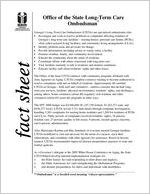fact sheet
Office of the State Long-Term Care Ombudsman*
Georgia's Long-Term Care Ombudsmen (LTCOs) are specialized ombudsmen who: Investigate and work to resolve problems or complaints affecting residents of
Georgia's long-term care facilities nursing homes; personal care homes (PCHs), often called assisted living facilities; and community living arrangements (CLAs). Identify problem areas and advocate for change. Provide information, including advice to wisely select a facility. Promote resident, family, and community involvement. Educate the community about the needs of residents. Coordinate efforts with others concerned with long-term care. Visit facilities routinely to talk to residents and monitor conditions. Educate facility staff about residents' rights and other issues.
The Office of the State LTCO contracts with community programs affiliated with Area Agencies on Aging. LTCOs complete extensive training to become authorized to resolve complaints with and on behalf of residents. Approximately 60 certified LTCOs in Georgia both staff and volunteers address concerns that include longterm care services, facilities' physical environments, residents' rights, and discharges, among others. Some volunteers (about 40) regularly visit residents and other volunteers (about 65) assist the programs in other ways.
The SFY 2006 budget was $2,946,698 ($1,247,150 federal, $1,263,271 state, and $436,277 local). LTCOs served 3,311 individuals through complaint investigation, handling 5,203 complaints for nursing home residents and 1,269 for residents of PCHs and CLAs. Thirty percent of complaints involved residents' rights; 28 percent, resident care; 27 percent, quality of life issues; 9 percent, outside agency concerns; and 6 percent, administration.
After Hurricanes Katrina and Rita, hundreds of evacuees entered Georgia facilities. LTCOs mobilized to visit and advocate for the needs of evacuees, track their whereabouts, and coordinate with other agencies for assistance. Based on lessons learned, LTCOs recommended improved disaster preparedness practices to state and federal agencies.
As a Governor's delegate to the 2005 White House Conference on Aging, the State LTCO helped develop national implementation strategies for: o the Elder Justice Act (and responding to elder abuse and neglect), o the Older Americans Act (and strengthening the Ombudsman Program), o and disaster preparedness for elders and individuals with disabilities.
*"Ombudsman" is a Swedish word meaning "citizen representative."
Office of the State LongTerm Care Ombudsman
Page 2
Ombudsmen, together with other interested parties, in FY 06: advocated for an increase in nursing home Medicaid beneficiaries' personal needs
allowance, allowing residents to keep $50 of their own money each month. The increase was passed by the General Assembly, signed into law by the Governor, and took effect on July 1, 2006. Residents conveyed to policy makers the challenges of living on the $1 per day / $30 per month level in place since 1988. promoted quality, person-directed care in Georgia's nursing homes. collaborated again with the Office of Regulatory Services and personal care home provider associations to select and celebrate personal care home "best practices" promoting resident health and independence. helped launch Georgia Public Guardians for "unbefriended" individuals who are unable to make their own decisions and are at risk, having no one entitled to promote their health and safety in many circumstances.
For more information, visit www.georgiaombudsman.org, contact your community program, or call the Office of the State LTCO at 888-454-LTCO (5826).
Georgia Department of Human Resources Office of Communications www.dhr.georgia.gov January 2007
2
